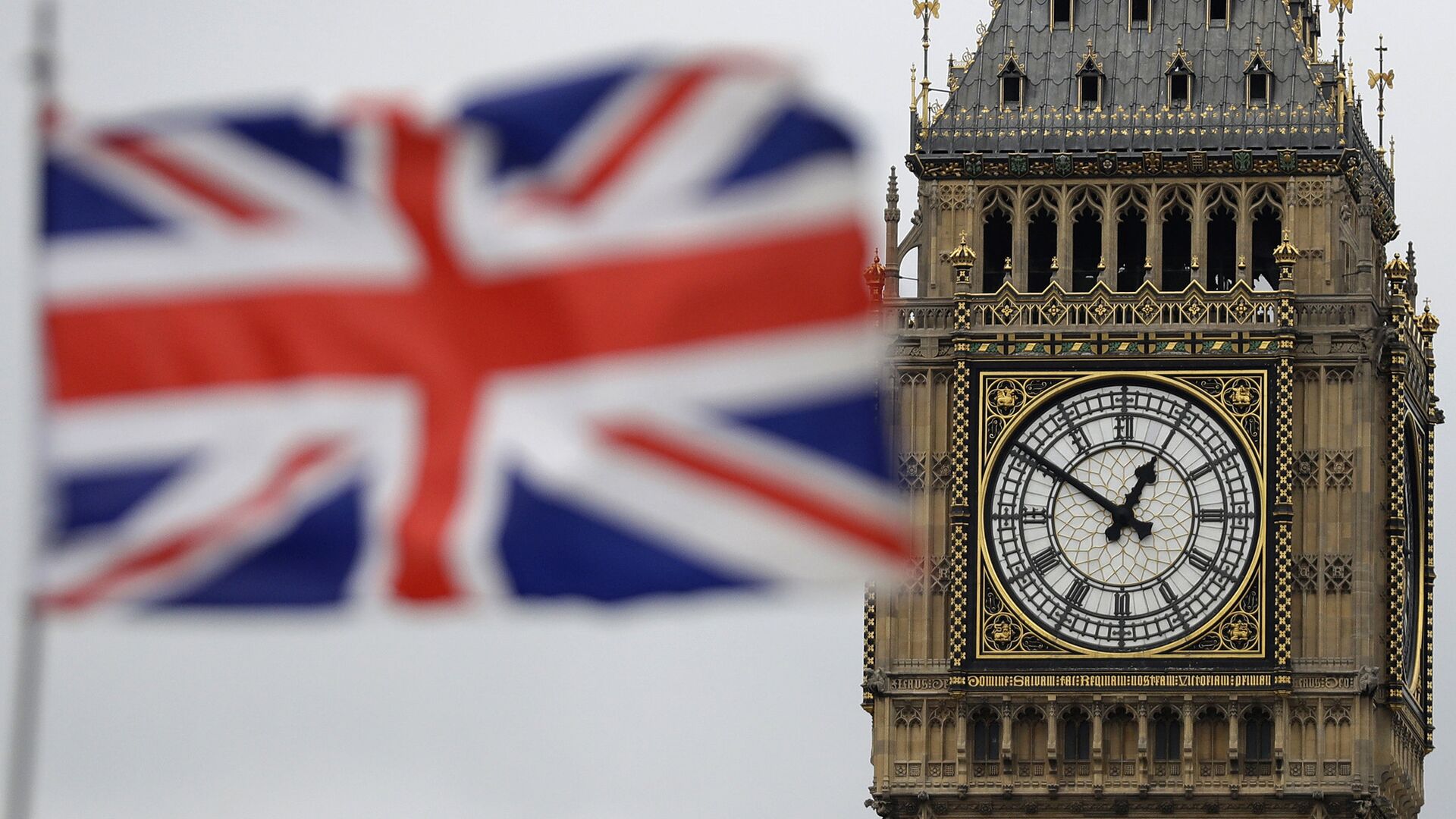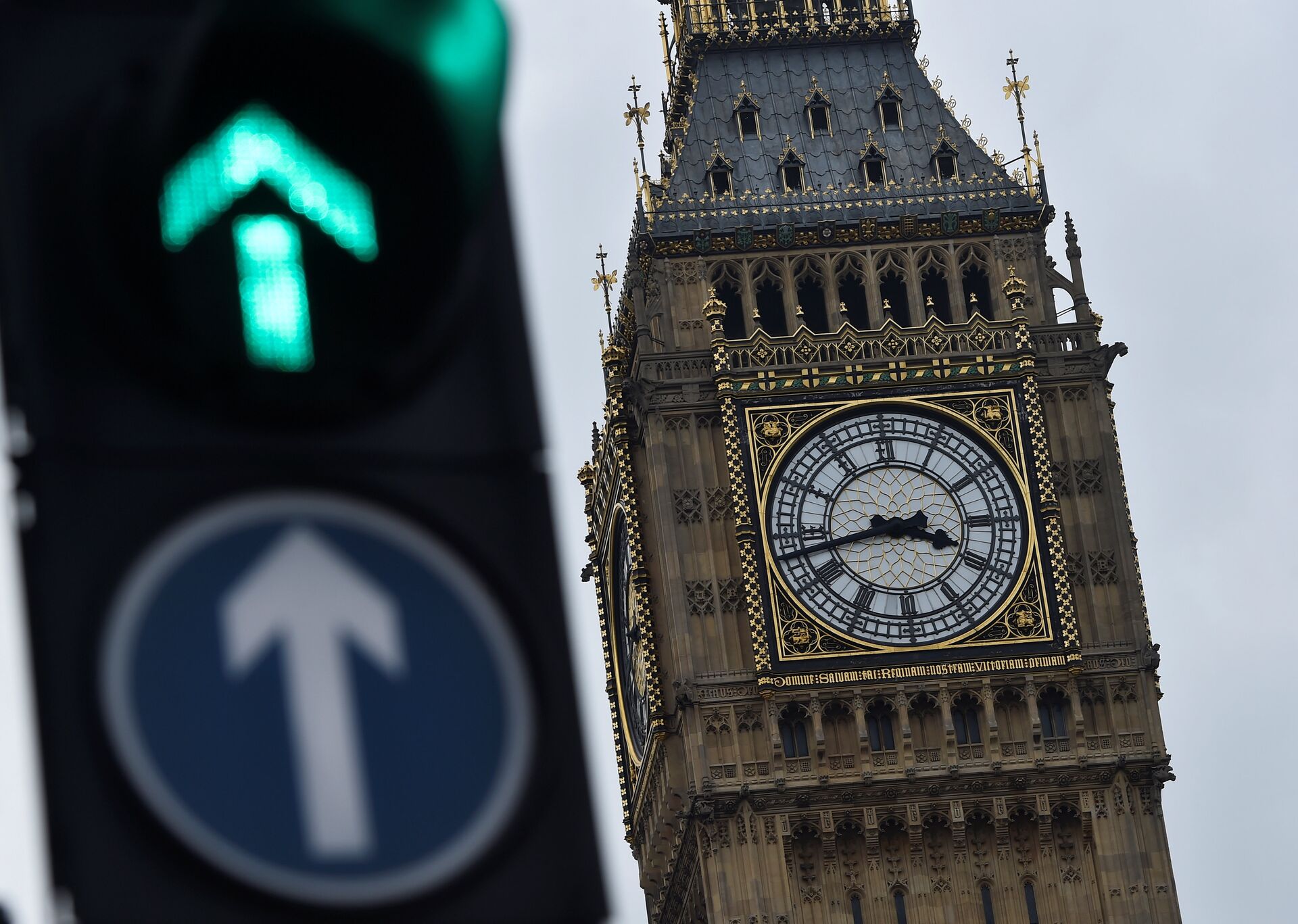https://sputnikglobe.com/20220418/uk-ministers-urged-by-lib-dem-to-turn-clocks-forward-by-one-hour-to-ease-cost-of-living-crisis-1094852098.html
UK Ministers Urged by Lib Dem to Turn Clocks Forward By One Hour to Ease Cost of Living Crisis
UK Ministers Urged by Lib Dem to Turn Clocks Forward By One Hour to Ease Cost of Living Crisis
Sputnik International
Throughout the past decades there have been several failed attempts by MPs to advocate a change in daylight savings time, with the most recent such effort in... 18.04.2022, Sputnik International
2022-04-18T10:37+0000
2022-04-18T10:37+0000
2023-05-28T15:19+0000
daylight savings
cost of living
united kingdom (uk)
https://cdn1.img.sputnikglobe.com/img/106549/85/1065498526_0:13:2428:1379_1920x0_80_0_0_0105edde3a5842182bdfb11be7718af9.jpg
As the cost of living crisis starts to bite, ministers have been facing calls to put British clocks forward by an extra hour to Central European Time, in line with most of Europe, to make better use of daylight, reported The Guardian.Maximising daylight in the evenings would help reduce household bills, insisted Liberal Democrat Peer John Lee.With inflation reaching a 30-year high and soaring energy bills, the British government should look seriously at “double summer time,” Lord Lee was cited as saying.Today the United Kingdom observes Greenwich Mean Time (GMT) during the winter months and British Summer Time (BST) in the summer months, setting the clocks forward 1 hour on the last Sunday in March and back again 1 hour on the last Sunday in October.The former MP pledged to bring the matter up as the House of Lords returns from recess later this month.UK History of TimekeepingThe first attempt to move clocks forward in summer came in 1908, but the Daylight Saving Bill was rejected by the House of Commons. In 1916, during World War I, when Germany was the first country to use DST nationwide, the UK followed suit.To save energy, the Summer Time Act 1916 advanced the clocks in the UK for 1 hour from May 21 until October 1.The practice was then named British Summer Time (BST).There were also periods when Daylight Saving Time (DST) was 2 hours ahead of standard time - known as “British Double Summer Time” (BDST), “Double Summer Time,” or “Double British Summer Time.”During World War II the UK implemented a DST period from February 25, 1940 to October 7, 1945, adding 1 hour to the time zone (UTC+1). But times went back to normal after the war.There was another period of British Double Summer Time (BDST) in 1947, due to severe fuel shortages gripping the country.In 1968, a three-year experiment was conducted with British Standard Time, keeping the clocks fixed throughout the year on GMT+1.In 1971, MPs voted to return to the system currently in place, but the debate over setting British clocks two hours ahead of Greenwich Mean Time during the summer months and one hour ahead in winter, as in continental nations like France, Spain and Italy, continues.MPs on the energy and climate change committee in 2010 tried unsuccessfully to advocate a change in daylight saving time in 2010. However, the government claimed the effects were “likely to be small in magnitude, and may even be uncertain in direction”.Back in 1993 a study by the Policy Studies Institute estimated that extending daylight hours could save more than £260m in electricity bills.More recently, campaigners have claimed each household could be saved 152 hours’ worth of electricity annually.The most vehement opposition to manipulating the time has come from farmers in Scotland, who argued that they would have to work in darkness for much of the morning.However, modern advances in farming have prompted the National Farmers Union of Scotland to say it was “open to further independent analysis”.Renewed debate over the benefits of "manipulating time" come as global energy and fuel prices have soared since the beginning of the year. Amid “self-inflicted” fallout from the sweeping sanctions applied to Moscow over its special operation in Ukraine, increasingly more households are being plagued with financial woes.
https://sputnikglobe.com/20220313/heres-why-daylight-saving-time-isnt-good-for-your-health-1093829709.html
https://sputnikglobe.com/20220417/poll-public-support-for-russian-sanctions-plummets-in-uk-as-cost-of-living-crisis-starts-to-bite-1094832075.html
united kingdom (uk)
Sputnik International
feedback@sputniknews.com
+74956456601
MIA „Rosiya Segodnya“
2022
News
en_EN
Sputnik International
feedback@sputniknews.com
+74956456601
MIA „Rosiya Segodnya“
Sputnik International
feedback@sputniknews.com
+74956456601
MIA „Rosiya Segodnya“
daylight savings, cost of living, united kingdom (uk)
daylight savings, cost of living, united kingdom (uk)
UK Ministers Urged by Lib Dem to Turn Clocks Forward By One Hour to Ease Cost of Living Crisis
10:37 GMT 18.04.2022 (Updated: 15:19 GMT 28.05.2023) Throughout the past decades there have been several failed attempts by MPs to advocate a change in daylight savings time, with the most recent such effort in 2010. However, the government claimed that the effects were “likely to be small in magnitude, and may even be uncertain in direction”.
As the
cost of living crisis starts to bite, ministers have been facing calls to put British clocks forward by an extra hour to Central European Time, in line with most of Europe, to make better use of daylight, reported The Guardian.
Maximising daylight in the evenings would help reduce household bills, insisted Liberal Democrat Peer John Lee.
With inflation reaching a 30-year high and soaring energy bills, the British government should look seriously at “double summer time,” Lord Lee was cited as saying.
Today the United Kingdom observes Greenwich Mean Time (GMT) during the winter months and British Summer Time (BST) in the summer months, setting the clocks forward 1 hour on the last Sunday in March and back again 1 hour on the last Sunday in October.
“It’s a serious, long-term issue for a sizeable proportion of the population and I think the government should look very seriously at it. Double summer time would be relatively cheap, it wouldn’t really cost the government anything of significance as far as I’m aware,” claimed Lee, the president of the Association of Leading Visitor Attractions and a former tourism minister.
The former MP pledged to bring the matter up as the House of Lords returns from recess later this month.
UK History of Timekeeping
The first attempt to move clocks forward in summer came in 1908, but the Daylight Saving Bill was rejected by the House of Commons. In 1916, during World War I, when Germany was the first country to use DST nationwide, the UK followed suit.
To save energy, the Summer Time Act 1916 advanced the clocks in the UK for 1 hour from May 21 until October 1.
The practice was then named British Summer Time (BST).
There were also periods when Daylight Saving Time (DST) was 2 hours ahead of standard time - known as “British Double Summer Time” (BDST), “Double Summer Time,” or “Double British Summer Time.”
During World War II the UK implemented a DST period from February 25, 1940 to October 7, 1945, adding 1 hour to the time zone (UTC+1). But times went back to normal after the war.
There was another period of British Double Summer Time (BDST) in 1947, due to severe fuel shortages gripping the country.
In 1968, a three-year experiment was conducted with British Standard Time, keeping the clocks fixed throughout the year on GMT+1.
In 1971, MPs voted to return to the system currently in place, but the debate over setting British clocks two hours ahead of Greenwich Mean Time during the summer months and one hour ahead in winter, as in continental nations like France, Spain and Italy, continues.
MPs on the energy and climate change committee in 2010 tried unsuccessfully to advocate a change in
daylight saving time in 2010. However, the government claimed the effects were “likely to be small in magnitude, and may even be uncertain in direction”.
Back in 1993 a study by the Policy Studies Institute estimated that extending daylight hours could save more than £260m in electricity bills.
More recently, campaigners have claimed each household could be saved 152 hours’ worth of electricity annually.
The most vehement opposition to manipulating the time has come from farmers in Scotland, who argued that they would have to work in darkness for much of the morning.
However, modern advances in farming have prompted the National Farmers Union of Scotland to say it was “open to further independent analysis”.
Renewed debate over the benefits of "manipulating time" come as global energy and fuel prices have soared since the beginning of the year. Amid “self-inflicted” fallout from the sweeping sanctions applied to Moscow over its special operation in Ukraine, increasingly more households are being plagued with
financial woes.






